Beacon of peace
In an exclusive interview, the 14th Dalai Lama speaks to Hoihnu Hauzel of The Telegraph
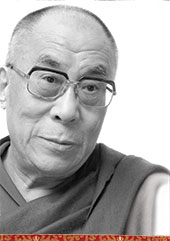
Pix: Rupinder Sharma
You cannot miss the aura that surrounds him. His laughter is infectious and he radiates an inner calm. At 75, the 14th Dalai Lama shows no sign of slowing down.
His is the single powerful voice that has strived to preserve Tibetan culture and spirit alive. The monk in exile who fled Tibet on March 31st, 51 years ago is today still a larger-than-life figure who is a crusader not just for the Tibetan cause but for the greater goal of world harmony.
The Dalai Lama is also a much sought after speaker who addresses global audiences on Buddhist teachings and also on ethical behaviour and Inter-faith harmony.
The Nobel Peace prize winner who’s also a human rights defender has very few airs and cheerfully admits that he keeps going through the day fortified by a hearty breakfast and a good night’s sleep.
In a candid conversation, he speaks his mind and shares his concern about Tibetan youngsters and a future in which the institution of the Dalai Lama may not exist.
Q. What keeps you going after all these years?
Good sleep (he laughs). I generally sleep by 8.30pm and get up by 3.30am. I have an hour of siesta every day. And then of course as a Buddhist monk, I usually skip dinner. I have a good breakfast consisting of fruits, cereals and some Tibetan tsampa. A good lunch is a part of my regime.
Another factor is my peaceful state of mind. And I would attribute this to the Buddhist teachings which emphasise the importance of emotions and how to deal with them.
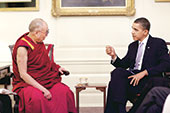
The Dalai Lama with US President Barack Obama
Q. You are constantly speaking to distinguished audiences in different corners of the globe. How do you prepare for your lectures?
There is no preparation as such. I speak what comes to my mind. Of course, the theme is usually arranged with the organisers who know my main interest, which is compassion or how to live happily in this life. I do not talk about the next life or the concept of heaven. My emphasis is on how to be a good member of a community.
But there are discussions that require me to do some homework. Depending on the subject, I read the main texts and related texts. In most cases I give lectures according to the texts written by Indian masters mainly the Nalanda masters. I also check with different Tibetan writings.
Q. I believe you’re on Twitter. What prompted you to use this technology and will it help you to reach out to Tibetan youth around the world?
Technology is a powerful tool today. Especially now, the truth about Tibet is slowly spreading in China through the Internet. As far as using the computer goes, I am hopeless at that — though my fingers are quite capable of using a screwdriver. I do not even use a telephone. I do not tweet personally — that is done on my behalf by my office.
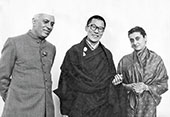

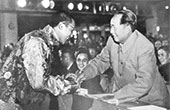
Looking back: (From top) His Holiness with Jawaharlal Nehru and Indira Gandhi; meeting with Mao Zedong; sharing a moment with Mother Teresa
Q. You have now been in exile for 51 years. Are you still hopeful of talks with China, and autonomy for Tibet?
The existing situation is not good for Tibetans or for the Chinese. But then the hardliners or the Communist hardliners usually don’t use their common sense. They lack a holistic view in their approach. Their policies are not based on sound or solid reasoning. Now, more Chinese intellectuals are realising their own mistakes. So, it is just a matter of time.
Today, the Chinese people themselves agree that besides economic development, other values like freedom of movement, expression or thought are lacking. As for the minorities like the Tibetans who have a different script, language and culture, they need an atmosphere where they can preserve and maintain their identity.
Q. What about the Tibetan youth in India. Are you concerned about them slowly losing their identity?
Generally, I do not think that Tibetan youth would forget their culture. A few individuals may forget. Judging by the last 51 years and looking at particularly those Tibetans who are born in Canada, America or Switzerland, some of them may not speak Tibetan but the spirit is alive in them. It’s a similar case in India too.
Q. What are the problems faced by Tibetan community in India?
Unemployment is growing among Tibetan youth. But this problem can be solved with more creative thinking. There are some skilled or college graduates who have taken up jobs in cities like Bangalore and Delhi. This number must increase. And meanwhile, the Tibetan youth must stay close. Ideally, they should come together occasionally on weekends despite their different engagements in order to keep their culture alive.
Q. Is your policy of pacifism under threat from young Tibetans today? Why do you think that after all these years, the Tibetan youth are advocating a different route from your “Middle Path”?
Right from the beginning, the Tibetan youth organisation has always stood differently. They stand for complete independence. So, they openly criticise or disagree with our Middle Way approach. We have decided to be fully committed to democracy and therefore have a different approach. And also some of our Indian supporters criticise our Middle Way approach saying it is very weak. It is understandable. They feel that Tibet should have the right to claim independence.
But our main concern is that there is so much destruction in Tibet and a systematic one that’s aiming at our unique Tibetan culture and language. Today, I feel the real and purer form of Tibetan culture or spirituality is found in India and not in Tibet.
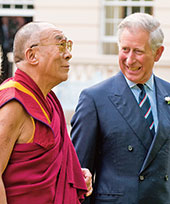
(From top) The Dalai Lama with Prince Charles; receiving the Nobel Prize in 1989; with Nelson Mandela
Q. What according to you would be more meaningful for Tibetans: autonomy or an Independent Tibet?
From a holistic view and from all aspects, it might be helpful to our economy if we remain within the People’s Republic of China. In the economic field, we may get greater benefit. I am not for independence merely for the sake of independence. It would have no meaning. Tibet is economically poor and China on the other hand is a huge country. It is not practical to be independent if there’s no benefit.
So, for Tibet we are open and willing to remain in the People’s Republic of China. It may be in our interest and of course, they must give us a meaningful autonomy to let us preserve our identity and culture. In fact, the Tibetan culture of compassion can help millions of young Chinese who have lost their moral principles. It might come handy to deal with the immense corruption there.
Q. Do you welcome the modernisation of Tibet or do you perceive it as a threat to Tibetan culture and identity? For instance, how do you regard developments like the Qinghai-Tibet Train or Lhasa Express — by making access and migration by the Han Chinese easier, is it threatening the Tibetan way of life?
I welcomed the initiative (the Lhasa Express) from the beginning when the Chinese government announced the project. It’s a sign of progress. But a lot depends on how it’s used. If it’s used to maximise exploitation and disregard the environment, it would be bad. And if, due to political reasons, the Chinese bring in more Han people (majority ethnic Chinese) while the military bring in more force, then in this light, it becomes bad. But the construction itself is very positive.
Q. And what is your response to the Chinese government’s recent intensified attacks on you, calling you a “splittist” among other things?
They also call me a demon and a wolf in the garb of a monk. Now they say that a wolf is among Indian sheep. I am just a simple monk and I have no problem with that. I feel pity that they are such short-sighted people. Such allegations only make them seem silly. Nobody believes that the Dalai Lama is a demon.
Q. You met the US President recently amidst protests by the Chinese. How was the meeting and do you see the US coming out and formally supporting the Tibetan cause?
Politically, I think Obama is the first person who officially supported our Middle Way approach. And then in other fields like development, he’s keen to support us to resettle our economy. Right from the beginning, he showed genuine concern for the community. Actually the American administration right from George Bush Senior has developed close relations with us.
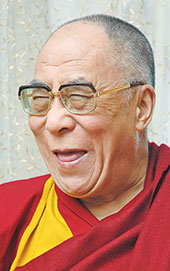
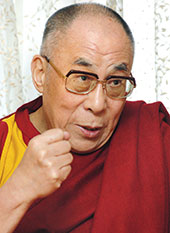
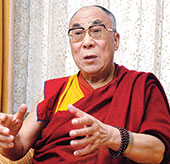
Pix:Rupinder Sharma
Q. After you, who? The Chinese government insists it will have final say on who will succeed you. Have you begun the search for a successor? Are you worried about who will lead the Tibetans after you?
In early 1969, I officially and formally stated that whether the very institution of Dalai Lama should continue or not depended on the Tibetan people. I have no concern if the majority of them feel that this centuries-old institution is no longer relevant. Now, as far as Tibetan spirituality or Tibetan culture is concerned, it ultimately depends on the people and not on an individual. Now, there will be a full implementation of democracy. For 20 years, I have been telling people that they should carry on as if there is no Dalai Lama.
In case, I die within the next few years, then most probably Tibetans may want to keep this institution. In that case, it is again their choice as to how they would carry on or select my successor. They are free to follow the traditional way or find a different way. In the last two or three years, I have discussed this matter with top spiritual leaders.
Q. How do you relax?
I mainly meditate for four to five hours daily. I meditate in the morning as soon as I get up. This can go on till 8.30am or longer, say about till 10am if I do not have meetings or appointments. Then in the afternoon, before I take a nap I have another one hour of meditation. This regime is important for me.
Q. Do you sometimes wish you could leave everything behind and be by yourself?
No. Although as a child I had wished that. My studies were compulsory and I didn’t want them. I wanted to join ordinary children and play. My education was carried on under compulsion and without enthusiasm or interest. My tutor kept a whip but fortunately never used it. Gradually, by the time I was 16 or 17 years, I started implementing what I studied.
But now, I have become more realistic and feel that through my position I have an opportunity to serve a wider group of people. Then I really feel that this is a purposeful life.
Q. You were keen on photography, what happened to that?
All gone.
Q. Do you have any message for India?
There are two things for India. One, the concept of Ahimsa, which has been a part of India’s tradition for thousands of years, is very much relevant in today’s world. The method of solving conflict by using force is totally wrong. There is no other choice to resolve any conflict except through a meaningful dialogue.
Secondly, India’s religious harmony is notable, making India a role model for the world.
Indian has more responsibility to promote this value to the world and particularly Asia. Indians should feel proud. In the last 60 years, India is the most stable nation despite many difficulties.
https://www.telegraphindia.com/1100404/jsp/graphiti/story_12295852.jsp
The Telegraph, Sunday, April 4, 2010



